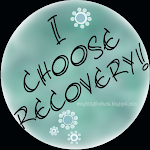
Please see sidebar for the poll, "What Was The Inspiration That Caused You To Seek Recovery From Your ED?"
The poll options are limited so if you have chosen "other," would like to add answers, elaborate on your answers, and/or discuss what led you to seek recovery please feel free to do so in the comment section of this post.
Thank you.
Completed Poll Results:
What Was The Inspiration That Caused You To Seek Recovery From Your ED? (choose all that apply)
ED treatment center | 4 (11%) |
Therapy | 7 (19%) |
Support of family | 8 (22%) |
Support of friend(s) | 9 (25%) |
Loss of friend(s) to ED | 2 (5%) |
Loss of family member to ED | 1 (2%) |
Fear of consequences | 10 (27%) |
Health issues | 12 (33%) |
Health concerns | 13 (36%) |
Severe illness | 4 (11%) |
Helping another with recovery | 3 (8%) |
Following the recovery of another | 2 (5%) |
Alternative medicine/methods | 2 (5%) |
Medication | 3 (8%) |
Art Therapy | 1 (2%) |
Meditation | 2 (5%) |
Hair loss | 5 (13%) |
Fear of dying | 6 (16%) |
Self-discovery | 10 (27%) |
ED awareness | 8 (22%) |
Support group | 2 (5%) |
Intervention | 5 (13%) |
I cant remember | 0 (0%) |
I'm trying but not inspired | 4 (11%) |
Other (please see below poll) | 2 (5%) |
I'm not in recovery | 5 (13%) |
I don't want recovery | 4 (11%) |
Votes: 36
More Poll Results
picture source:photbucket.com


 0
comments
0
comments



















